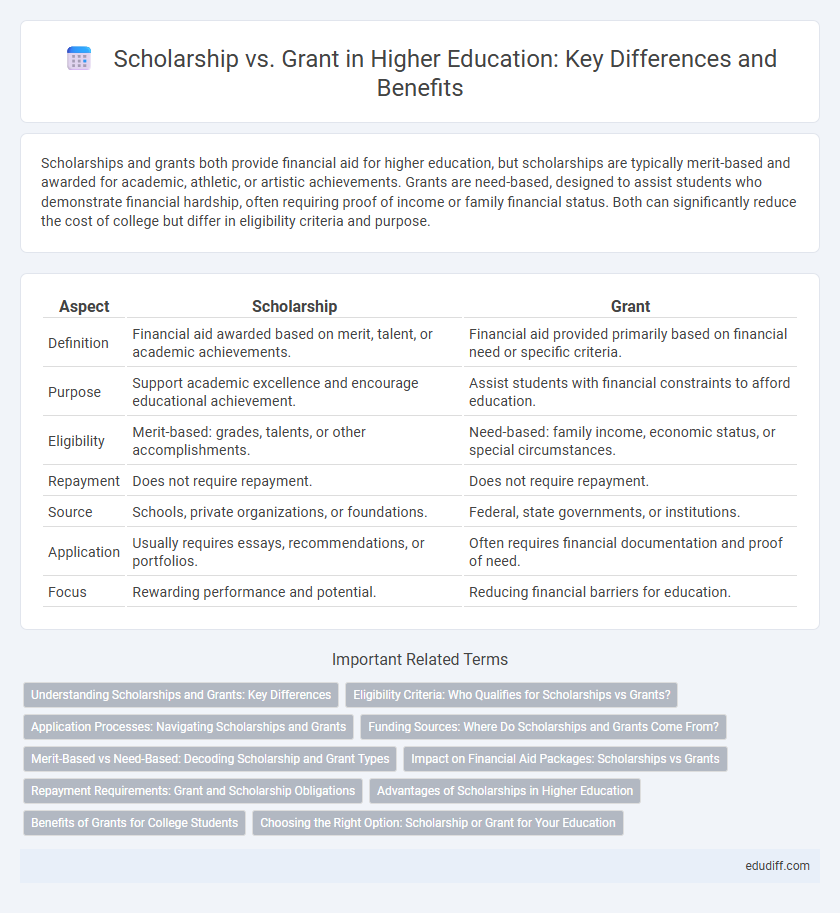Scholarships and grants both provide financial aid for higher education, but scholarships are typically merit-based and awarded for academic, athletic, or artistic achievements. Grants are need-based, designed to assist students who demonstrate financial hardship, often requiring proof of income or family financial status. Both can significantly reduce the cost of college but differ in eligibility criteria and purpose.
Table of Comparison
| Aspect | Scholarship | Grant |
|---|---|---|
| Definition | Financial aid awarded based on merit, talent, or academic achievements. | Financial aid provided primarily based on financial need or specific criteria. |
| Purpose | Support academic excellence and encourage educational achievement. | Assist students with financial constraints to afford education. |
| Eligibility | Merit-based: grades, talents, or other accomplishments. | Need-based: family income, economic status, or special circumstances. |
| Repayment | Does not require repayment. | Does not require repayment. |
| Source | Schools, private organizations, or foundations. | Federal, state governments, or institutions. |
| Application | Usually requires essays, recommendations, or portfolios. | Often requires financial documentation and proof of need. |
| Focus | Rewarding performance and potential. | Reducing financial barriers for education. |
Understanding Scholarships and Grants: Key Differences
Scholarships are merit-based financial awards often granted for academic achievements, talents, or specific criteria, while grants are typically need-based funds aimed at supporting students with financial barriers. Scholarships usually do not require repayment and may be renewable depending on maintaining eligibility, whereas grants are strictly need-oriented and frequently provided by government or institutional programs. Both scholarships and grants reduce the overall cost of higher education but differ primarily in eligibility requirements and funding sources.
Eligibility Criteria: Who Qualifies for Scholarships vs Grants?
Scholarships typically require applicants to demonstrate specific academic achievements, talents, or extracurricular involvement, often targeting high-performing students or those with unique skills. Grants usually focus on financial need, with eligibility determined by factors such as family income, economic hardship, or demographic criteria, prioritizing students from low-income backgrounds. Both scholarships and grants aim to make higher education accessible but differ significantly in their qualification standards based on merit versus need.
Application Processes: Navigating Scholarships and Grants
Scholarship application processes typically require detailed essays, recommendation letters, and proof of academic achievements to assess merit and eligibility. Grants often demand submission of project proposals or financial need documentation to justify funding allocation. Understanding these distinct requirements streamlines navigating opportunities for higher education funding and increases success rates.
Funding Sources: Where Do Scholarships and Grants Come From?
Scholarships primarily originate from private organizations, educational institutions, and corporations aiming to reward academic achievement or specific talents. Grants are predominantly funded by federal and state governments, designed to support students based on financial need or research projects. Both funding sources play crucial roles in reducing educational expenses but vary significantly in eligibility criteria and application requirements.
Merit-Based vs Need-Based: Decoding Scholarship and Grant Types
Merit-based scholarships reward academic, artistic, or athletic achievements, often requiring a minimum GPA or portfolio submission. Need-based grants prioritize financial need, assessed through household income and economic hardship documentation, aiming to reduce education costs for low-income students. Understanding these distinctions helps applicants target funding opportunities aligned with their qualifications and financial situations.
Impact on Financial Aid Packages: Scholarships vs Grants
Scholarships and grants both reduce the overall cost of higher education by directly lowering tuition expenses and fees. Scholarships are often merit-based and may impact financial aid packages by reducing need-based aid eligibility, whereas grants, typically need-based, directly supplement financial aid without affecting eligibility for other support. Understanding the distinctions helps students optimize their financial aid strategy to maximize available resources.
Repayment Requirements: Grant and Scholarship Obligations
Scholarships and grants both provide financial aid that typically does not require repayment, easing the burden of higher education costs. Grants, often need-based, may come with stipulations such as maintaining enrollment status or pursuing a specific field of study, while scholarships might demand academic performance, extracurricular involvement, or service commitments. Understanding these obligations is crucial to ensure compliance and retain eligibility throughout the academic program.
Advantages of Scholarships in Higher Education
Scholarships in higher education offer significant financial relief without the obligation of repayment, enabling students to focus on academic and personal growth. They enhance a student's resume by recognizing merit, leadership, or specific talents, thus improving future career and educational opportunities. Unlike grants, scholarships often foster a sense of achievement and motivation, encouraging recipients to maintain high performance standards throughout their studies.
Benefits of Grants for College Students
Grants provide college students with non-repayable financial aid that reduces the need for loans, offering significant economic relief. These funds often target specific demographics or fields of study, promoting diversity and specialized education. Access to grants can alleviate tuition costs and support essential academic resources, enhancing overall student success.
Choosing the Right Option: Scholarship or Grant for Your Education
Choosing the right financial aid option depends on eligibility criteria and the purpose of your education funding; scholarships primarily reward academic merit or special talents while grants often address financial need-based support. Understanding requirements such as maintaining GPA for scholarships or proving economic hardship for grants ensures effective application and maximum benefit. Evaluate program-specific details at institutions or governmental sources to align your educational goals with the most suitable aid type.
Scholarship vs Grant Infographic

 edudiff.com
edudiff.com